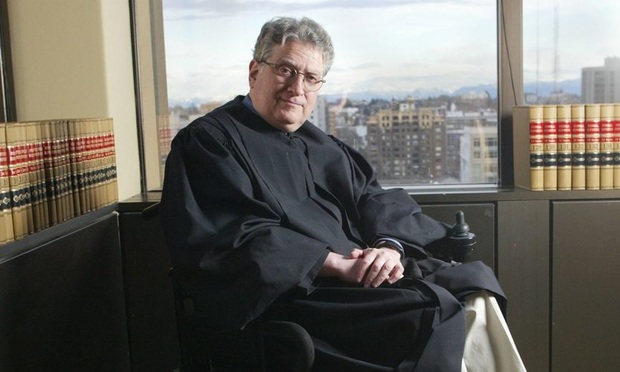Copyright Suit Against Microsoft Is Precluded by Earlier Patent Suit
The Ninth Circuit ruled that both suits by Media Rights Technologies were based on the same nucleus of facts about alleged software misappropriation. That precludes all copyright claims that accrued before the filing of a 2013 patent suit.
May 02, 2019 at 07:03 PM
4 minute read
 Judge Ronald Gould, U.S. Court of Appeal for the Ninth Circuit.
Judge Ronald Gould, U.S. Court of Appeal for the Ninth Circuit.
An unsuccessful patent litigant can be precluded from bringing copyright claims that arise from the same allegations of IP theft, the U.S. Court of Appeals for the Ninth Circuit ruled Thursday.
The court ruled that Media Rights Technologies Inc. (MRT) cannot sue Microsoft Corp. for copyright and Digital Millennium Copyright Act violations that could have been included in its 2013 patent suit against the tech giant.
“These claims all arise from the same events—Microsoft's alleged misappropriation of MRT's software—as the prior patent infringement claims,” Judge Ronald Gould wrote for a unanimous panel. “They merely offer different legal theories for why Microsoft's alleged conduct was wrongful.”
But the court ruled MRT is still free to bring copyright claims based on alleged infringement that occurred after it filed its 2013 suit.
Though the ruling is case-specific, the narrative pleaded by MRT is a familiar one in the tech industry. The company contends it developed a pioneering digital rights management technology for preventing music piracy in the early 2000s. The company marketed it as BlueBeat Secure Player.
During confidential negotiations in 2004, Microsoft offered $50 million for a controlling share of the company, MRT alleges. MRT declined the offer. Microsoft then allegedly developed its own version of the software using MRT's technology. MRT says it can prove that Microsoft copied its source code because it embedded a digital watermark that shows up in a variety of Microsoft products.
MRT sued for patent infringement in 2013, asserting four patents, but dropped the suit after one of the patents was found invalid in a separate action. A year later, in 2017, it brought the present copyright and breach-of-contract suit in the Northern District of California. U.S. Magistrate Judge Sallie Kim ruled that all of the claims, accruing both before and after the patent suit, were precluded.
Before the Ninth Circuit, Feinberg Day Alberti Lim & Belloli partner Ian Feinberg argued that the copyright claims were “wildly different” from the patent claims and involved a different set of accused products. “Discovering that somebody has copied your code is wholly different from discovering that they may have infringed your patents,” he told the court.
The Ninth Circuit noted that under copyright law, a discrete claim arises each time an infringing work is reproduced or redistributed. Therefore, all of the alleged infringement that occurred after MRT brought its 2013 suit is fair game, the court concluded.
But the court found MRT should have been aware of the copyright violations by 2013, so all of the earlier claims are subject to claim preclusion. “Although the legal theories differ and the complaint here is more detailed, the factual basis for MRT's patent infringement claims in MRT I and its pre-filing copyright infringement claims here is the same,” Gould wrote. “That the two actions 'relate to the same set of facts' favors preclusion.”
That echoed the argument Fish & Richardson partner Jonathan Lamberson made for Microsoft before the court: “Copying is central” to the patent complaint, he told the judges.
Moreover, Gould wrote, the patent and copyright claims form “a convenient trial unit that discloses a cohesive narrative,” which the Ninth Circuit has also found to favor preclusion.
“Indeed, patent infringement and copyright infringement claims are often tried together, including in large, complex cases,” Gould wrote, though he stressed that other patent and copyright suits will not always be preclusive of one another.
Ninth Circuit Judge Marsha Berzon and U.S. District Judge Frederic Block, visiting from Eastern District of New York, concurred.
This content has been archived. It is available through our partners, LexisNexis® and Bloomberg Law.
To view this content, please continue to their sites.
Not a Lexis Subscriber?
Subscribe Now
Not a Bloomberg Law Subscriber?
Subscribe Now
NOT FOR REPRINT
© 2025 ALM Global, LLC, All Rights Reserved. Request academic re-use from www.copyright.com. All other uses, submit a request to [email protected]. For more information visit Asset & Logo Licensing.
You Might Like
View All
Davis Wright Tremaine Turns to Gen AI to Teach Its Associates Legal Writing
4 minute read

DOJ, 10 State AGs File Amended Antitrust Complaint Against RealPage and Big Landlords
4 minute read
Apple Agrees to Pay $95 Million Settlement in Siri Voice Assistant Privacy Class Action
Trending Stories
Who Got The Work
J. Brugh Lower of Gibbons has entered an appearance for industrial equipment supplier Devco Corporation in a pending trademark infringement lawsuit. The suit, accusing the defendant of selling knock-off Graco products, was filed Dec. 18 in New Jersey District Court by Rivkin Radler on behalf of Graco Inc. and Graco Minnesota. The case, assigned to U.S. District Judge Zahid N. Quraishi, is 3:24-cv-11294, Graco Inc. et al v. Devco Corporation.
Who Got The Work
Rebecca Maller-Stein and Kent A. Yalowitz of Arnold & Porter Kaye Scholer have entered their appearances for Hanaco Venture Capital and its executives, Lior Prosor and David Frankel, in a pending securities lawsuit. The action, filed on Dec. 24 in New York Southern District Court by Zell, Aron & Co. on behalf of Goldeneye Advisors, accuses the defendants of negligently and fraudulently managing the plaintiff's $1 million investment. The case, assigned to U.S. District Judge Vernon S. Broderick, is 1:24-cv-09918, Goldeneye Advisors, LLC v. Hanaco Venture Capital, Ltd. et al.
Who Got The Work
Attorneys from A&O Shearman has stepped in as defense counsel for Toronto-Dominion Bank and other defendants in a pending securities class action. The suit, filed Dec. 11 in New York Southern District Court by Bleichmar Fonti & Auld, accuses the defendants of concealing the bank's 'pervasive' deficiencies in regards to its compliance with the Bank Secrecy Act and the quality of its anti-money laundering controls. The case, assigned to U.S. District Judge Arun Subramanian, is 1:24-cv-09445, Gonzalez v. The Toronto-Dominion Bank et al.
Who Got The Work
Crown Castle International, a Pennsylvania company providing shared communications infrastructure, has turned to Luke D. Wolf of Gordon Rees Scully Mansukhani to fend off a pending breach-of-contract lawsuit. The court action, filed Nov. 25 in Michigan Eastern District Court by Hooper Hathaway PC on behalf of The Town Residences LLC, accuses Crown Castle of failing to transfer approximately $30,000 in utility payments from T-Mobile in breach of a roof-top lease and assignment agreement. The case, assigned to U.S. District Judge Susan K. Declercq, is 2:24-cv-13131, The Town Residences LLC v. T-Mobile US, Inc. et al.
Who Got The Work
Wilfred P. Coronato and Daniel M. Schwartz of McCarter & English have stepped in as defense counsel to Electrolux Home Products Inc. in a pending product liability lawsuit. The court action, filed Nov. 26 in New York Eastern District Court by Poulos Lopiccolo PC and Nagel Rice LLP on behalf of David Stern, alleges that the defendant's refrigerators’ drawers and shelving repeatedly break and fall apart within months after purchase. The case, assigned to U.S. District Judge Joan M. Azrack, is 2:24-cv-08204, Stern v. Electrolux Home Products, Inc.
Featured Firms
Law Offices of Gary Martin Hays & Associates, P.C.
(470) 294-1674
Law Offices of Mark E. Salomone
(857) 444-6468
Smith & Hassler
(713) 739-1250






